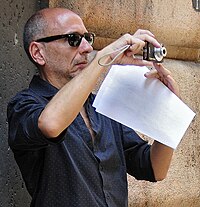Uki Goñi
Uki Goñi | |
|---|---|
 | |
| Born | 1953 (age 67–68) Washington D.C., U.S. |
| Occupation |
|
| Nationality | Argentine |
| Genre |
|
| Website | |
| www | |
Uki Goñi (born 1953) is an Argentine author. His research focuses on the role of the Vatican, Swiss authorities and the government of Argentina in organizing 'ratlines', escape routes for Nazi criminals and collaborators.
Personal life[]
Goñi was born in Washington, D.C. in 1953 and was raised in the US, Argentina, Mexico, and Ireland. Since 1975 he has lived in Buenos Aires, Argentina.[1]
Investigations[]
Drawing on investigations in Argentine, Swiss, American, British, and Belgian government archives, as well as numerous interviews and other sources, Goñi's conclusions are detailed extensively in The Real Odessa: Smuggling the Nazis to Perón's Argentina[a] and several follow-up books. He also wrote an article for The Guardian in which scientific testing on a skull fragment put into question the authenticity of mainstream accounts of the death of Adolf Hitler.[2]
Goñi is also well known for his reporting on the crimes of Argentina's 1976–83 military dictatorship while he worked at the Buenos Aires Herald newspaper during those years, and as a witness in two of the trials against former officers of the dictatorship.[3]
Repercussions[]
The Real Odessa: Smuggling the Nazis to Perón's Argentina, originally published in London in 2002 and since then translated into Spanish, Italian, Slovenian, Portuguese and German, has had wide repercussions in those countries through which Nazi criminals and their collaborators passed in their escape, especially in Italy, the Netherlands and Argentina.[4] Following publication of the book in Italy, a group of parliamentarians in Rome demanded that Prime Minister Berlusconi open an investigation into the passage of Nazis through their country.[5]
In Milan, SS criminal Erich Priebke, sentenced to life imprisonment for his part in the Ardeatine Caves Massacre of 1944, sought a court injunction against the Italian translation of Goñi's book, demanding 50,000 euros in damages. He was turned down on both counts, although he had already won a series of judicial cases against media stories about him.
In Genoa, archbishop Tarcisio Bertone distributed 50,000 copies of a "Special Edition" of "Settimanale Cattolico" ("Catholic Weekly") announcing the creation of a special commission of inquiry to investigate Goñi's revelations regarding the role of the Genoese curia in aiding the flight of Nazi war criminals through the port city. In the Netherlands, KLM opened an internal investigation following the book's unearthing of documents regarding the use of the airline by Nazi officers after the war.[6]
In Argentina, President Néstor Kirchner ordered the repeal of a secret directive of 1938 prohibiting Argentine diplomats from granting visas to Jews fleeing from the Holocaust in Europe. This was the first official admission by the Argentine government of the anti-Semitism that marked the country's immigration policies during and after World War II. Goñi's book also caused previously secret files relating to the entry of Croatian and other war criminals to Argentina to be released.
Other works[]
Goñi writes for The New York Times, The New York Review of Books, The Guardian, and TIME.[7][8][9] He has also written for various publications in Argentina.[10]
He is also the author of two previous books in Spanish, El infiltrado, la verdadera historia de Alfredo Astiz,[b] regarding crimes committed by Argentina's 1976–83 military dictatorship, and Perón y los alemanes,[c] on wartime links between Berlin and Buenos Aires.[11]
Music[]
Uki Goñi is also a musician.[12] He formed his first band (Space Age Serenity) while growing up in Dublin, Ireland. In Argentina he has played and recorded with major artists such as folk musician Peteco Carabajal, the rock band Mancha de Rolando, blues guitarist Claudio Gabis, pop singer Adrián Dárgelos as well as with his own long-time band Los Helicópteros.[13]
Books[]
The Real Odessa[]
- The Real Odessa, Granta Books, London-New York, 2002
- La auténtica Odessa, Paidós, Barcelona-Buenos Aires, 2002
- Operazione Odessa, Garzanti Libri, Milano, 2003
- A verdadeira Odessa, Editorial Record, Rio de Janeiro, 2004
- Odessa: Die Wahre Geschichte, Assoziation-A, Hamburg & Berlin, 2006
- Resnicna Odessa, Ciceron, Eslovenia, 2006
- La auténtica Odessa: Edición 2008, Area Paidós, Buenos Aires, 2008
- Prawdziwa Odessa. Jak Peron sprowadził hitlerowskich zbrodniarzy do Argentyny, Wydawnictwo Replika, 2016
Other[]
- El Infiltrado. La verdadera historia de Alfredo Astiz, Editorial Sudamericana, Buenos Aires, 1996
- Perón y los Alemanes, Editorial Sudamericana, Buenos Aires, 1998
References[]
Footnotes
Citations
- ^ Article on Goni's background at the International Raoul Wallenberg Foundation website.
- ^ Goñi, Uki (27 September 2009). "Tests on skull fragment cast doubt on Adolf Hitler suicide story". The Guardian. London. Retrieved 1 January 2019.
- ^ "Political Hatred in Argentina | Boston Review". bostonreview.net. Retrieved 2015-09-30.
- ^ As documented in the books English review at PAIDOS books.
- ^ Barry James (June 17, 1994). "He Vows to Press for Return of Suspected Nazi Criminal: A Berlusconi Bid to Polish Image?". New York Times. Archived from the original on 16 September 2016.
- ^ KLM accused (May 8, 2007 - The Times Online website)
- ^ "Uki Goñi". Retrieved 2015-09-30.
- ^ "Uki Goñi". the Guardian. Retrieved 2015-09-30.
- ^ "Uki Goni - TIME". TIME.com. Retrieved 2015-09-30.
- ^ Uki's journalistics (on the journalisted.com website)
- ^ Books by Uki Goñi
- ^ Interview with Uki Goñi (Interview in the daily Clarín about Uki Goñi's musical work)
- ^ UkiMusic (Uki Official YouTube Music Channel)
External links[]
- 1953 births
- Living people
- Alumni of Trinity College Dublin
- Argentine historians
- Argentine male writers
- People from Washington, D.C.
- Writers from Buenos Aires